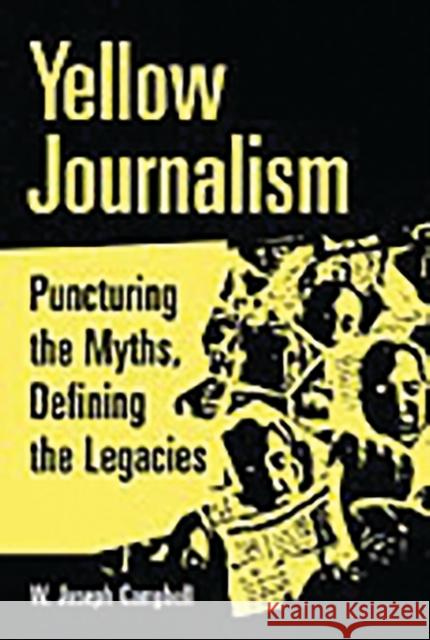Yellow Journalism: Puncturing the Myths, Defining the Legacies » książka
Yellow Journalism: Puncturing the Myths, Defining the Legacies
ISBN-13: 9780275981136 / Angielski / Miękka / 2003 / 240 str.
Yellow Journalism: Puncturing the Myths, Defining the Legacies
ISBN-13: 9780275981136 / Angielski / Miękka / 2003 / 240 str.
(netto: 171,85 VAT: 5%)
Najniższa cena z 30 dni: 178,24
ok. 30 dni roboczych.
Darmowa dostawa!
This offers a detailed and long-awaited reassessment of one of the most maligned periods in American journalism the era of the yellow press. The study challenges and dismantles several prominent myths about the genre, finding that the yellow press did not foment could not have fomented the Spanish-American War in 1898, contrary to the arguments of many media historians. The study presents extensive evidence showing that the famous exchange of telegrams between the artist Frederic Remington and newspaper publisher William Randolph Hearst in which Hearst is said to have vowed to furnish the war with Spain almost certainly never took place. The study also presents the results of a systematic content analysis of seven leading U. S. newspapers at 10 year intervals throughout the 20th century and finds that some distinguishing features of the yellow press live on in American journalism.The yellow press period in American journalism history has produced many powerful and enduring myths-almost none of them true. This study explores these legends, presenting extensive evidence that: The yellow press did not foment-could not have fomented-the Spanish-American War in 1898, contrary of the arguments of many media historians The famous exchange of telegrams between the artist Frederic Remington and newspaper publisher William Randolph Hearst-in which Hearst is said to have vowed to furnish the war with Spain-almost certainly never took place The readership of the yellow press was not confined to immigrants and people having an uncertain command of English, as many media historians maintainThe study also presents the results of a detailed content analysis of seven leading U.S. newspapers at 10-year intervals, from 1899 to 1999. The content analysis which included the Denver Post, Los Angeles Times, New York Times, Raleigh News and Observer, St. Louis Post-Dispatch, San Francisco Examine and Washington Post reveal that some elements characteristic of yellow journalism have been generally adopted by leading U. S. newspapers. This critical assessment encourages a more precise understanding of the history of yellow journalism, appealing to scholars of American journalism, journalism history, and practicing journalists."











